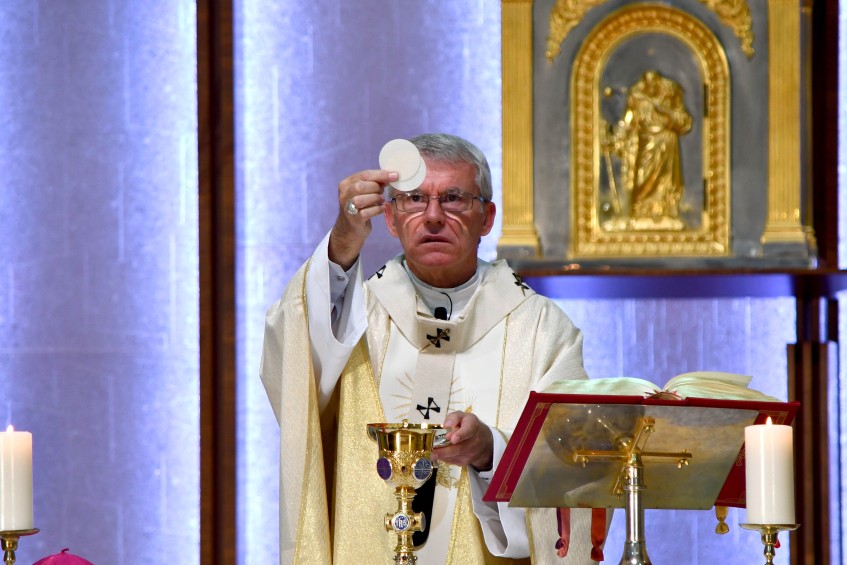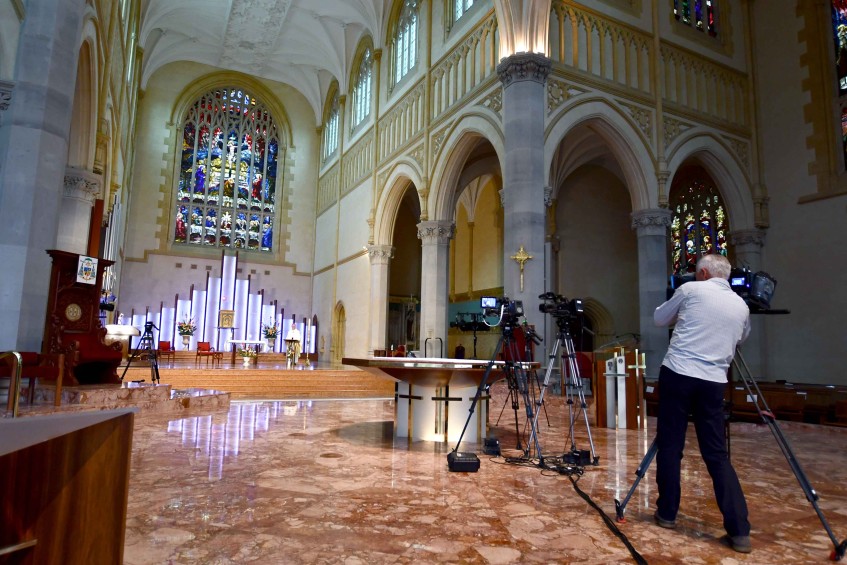EASTER 2020: Easter Masses celebrated online to combat COVID-19 pandemic

By Eric Martin
The reality of the COVID–19 crisis crashed home for Perth Catholics at this, the holiest time of the year, with Archbishop Timothy Costelloe SDB celebrating the Easter Vigil and Easter Sunday Mass in front of an empty St Mary’s Cathedral for the first time in living history.
Archbishop Costelloe was joined by Auxiliary Bishop Donald Sproxton concelebrating as well as Cathedral Dean Father Sean Fernandez and nearly 20,000 viewers between the two celebrations.
Both Masses were celebrated in front of the tabernacle, inviting the Perth community into an intimate setting to share a message of hope.
Archbishop Costelloe, in his homily that was also additionally recorded with AUSLAN, said in the present crisis through which we are all living, we are seeing the best and the worst in our society and perhaps in ourselves.

Camera crews, sound engineers and technicians work alongside the curia to ensure that the Easter Message goes out to the faithful. Photo: Archdiocese of Perth.
“The empty shelves in our shops, at least initially stripped of the necessities of life by those who had been determined to look out for themselves, with little thought for others whose need was equally great, speaks of careless disregard for others,” His Grace said.
“It is in sharp contrast with the extraordinary courage of those working in our hospitals and other health facilities, putting their own lives at risk in order to care for the sick.
“The attitude of those carelessly flouting the social distancing rules is unmasked by the countless examples of good humour, common sense and quiet acceptance of the vast majority who see the restrictions as the best way to care for themselves, their families and our wider society,” he explained.
He shared that similarly, we see both the best and the worst of the disciples in that terrible story of Good Friday – that the darkness and despair of that afternoon overpowered most of the disciples, but could not extinguish the light of faith and love which burned in the hearts of Mary and the beloved disciple.
“What the Easter story reminds us,” Archbishop Costelloe said.
“Is that the world cannot be simply divided into two camps: the wonderfully good and the irredeemably bad: the Christian tradition tells us that, with the stark exception of Judas, every one of those first disciples, and many others besides, eventually became courageous followers of and witnesses to Jesus, even to the point of death.
“Peter, for example, the great denier of Jesus, is crucified upside down in Rome because of his fearless leadership of the Church and is buried in a pagan cemetery outside the city.”
His Grace challenged his online audience to ask themselves: “What can change us from people driven by the worst of our instincts into people in whom the very best within us begins to come to its full flowering?”.
“It will be the very same thing which transformed those first disciples,” he answered.
“The belief, the absolute conviction, that fear and selfishness will always be defeated by courage and large–hearted generosity; that love for others and for God will always provide a more solid foundation for our lives that mere self–interest.
“And ultimately, that life itself is more powerful than death and that death, in fact, is powerless in the face of the life which comes from God.”
He shared that this is what the resurrection of Jesus means; it is not a fairy story or an impossible dream as “it is real, it is true, and it is the source of the Church’s hope, of our hope, even and perhaps especially in the face of the present world crisis enveloping us”.
“But, if I may say this, it is a hope that springs from a conviction which lives both in our heads and in our hearts,” Archbishop Costelloe continued.
“The resurrection of Jesus is not simply an event from the past – it is a present reality.
“It is not simply something ‘out there’ which we can observe from a distance – it is ‘in here’, in my heart, in our hearts, in the heart of the Church.
“It was because the disciples knew that Jesus had risen from the dead – the gospels tell us that they ate and drank with him after his resurrection – that the worst in them was overcome by the best in them,” he concluded.
